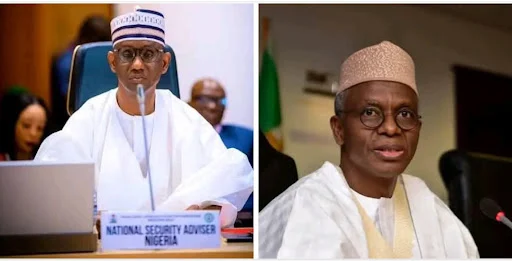A Silent Contest for the Northern Presidency
As Nigeria’s political landscape continues to evolve under President Bola Ahmed Tinubu’s administration, strategic positioning for the post-2031 era is already unfolding among northern elites. Among the key players maneuvering behind the scenes, two prominent figures stand out—Malam Nasir El-Rufai, former Governor of Kaduna State, and Mallam Nuhu Ribadu, the current National Security Adviser. Both men, though serving in different capacities, seem to be setting the stage for a larger political battle that could determine who succeeds Tinubu when power is expected to shift back to the North after his second term.
While the 2027 elections remain a crucial stepping stone, it is merely a means to an end. For these two political gladiators, the ultimate prize lies beyond—the presidency in 2031.
El-Rufai’s Calculated Comeback
Since leaving office in 2023, Nasir El-Rufai has maintained a deliberately low profile, avoiding political entanglements while reportedly pursuing further studies. His decision to sit out of active politics was seen as a tactical retreat rather than a withdrawal. But in a rare interview with Freedom Radio Kaduna, he left little doubt about his future intentions, stating:
> “I intend to return to politics in 2027 after completing my studies. There is no retirement in politics. By the will of Allah, we will return and continue serving the people.”
This declaration has been widely interpreted as a signal of his long-term political ambitions. With the North expected to reclaim the presidency in 2031 under Nigeria’s informal power rotation system, El-Rufai understands that re-establishing his national presence in 2027 is critical. His silence is strategic, not passive.
Why is 2027 important for El-Rufai?
Rebuilding his national image: Unlike Kwankwaso, Atiku, or even a sitting governor like Zulum, El-Rufai lacks an organized grassroots movement outside Kaduna. To become a formidable presidential contender in 2031, he must broaden his appeal and gain influence beyond the APC power structure.
Strengthening political alliances: 2027 will provide an opportunity for him to align with emerging power blocs within the APC or even explore alliances across party lines.
Distancing himself from Kaduna's controversies: His tenure as governor was marked by bold but controversial decisions, including demolitions, restructuring of traditional institutions, and clashes with religious leaders. Before making a national push, he must reshape his image as a unifier, not a divisive figure.
Analysts suggest that if he returns to politics in 2027, it might not be as a candidate but rather as a kingmaker, a senator, or even a vice-presidential prospect—each position strengthening his leverage ahead of 2031.
Ribadu’s Silent Ascent
Unlike El-Rufai, Nuhu Ribadu is already embedded in President Tinubu’s administration, holding the highly sensitive position of National Security Adviser (NSA).
While Ribadu has historically maintained a low political profile, his current role places him at the heart of governance, security intelligence, and power negotiations. His steady rise has led many to speculate that he is quietly building his own pathway to 2031.
Why Ribadu’s Position Is Crucial
1. Security as a Political Asset: In a country battling terrorism, banditry, and economic sabotage, a leader with security credentials will have a strong political advantage in 2031.
2. Influence Over Key Decision-Makers: As NSA, Ribadu interacts closely with the military, intelligence community, and global security networks, giving him access to critical information and alliances.
3. Heir to Tinubu’s Political Structure? Many believe that if Ribadu can maintain Tinubu’s trust and demonstrate competence in handling Nigeria’s fragile security situation, he could be considered a natural successor within the APC.
Unlike El-Rufai, who is actively trying to create his national spread, Ribadu is already embedded within the corridors of power. His challenge, however, is that he lacks a strong political base of his own. Unlike El-Rufai’s Kaduna bloc or Kwankwaso’s Kano movement, Ribadu has never held an elected position. If he harbors presidential aspirations, he will need a visible political structure by 2027.
The Political Gladiators and the Road to 2031
With Kwankwaso, Zulum, Atiku, and even newer political entrants like Wike in the picture, the fight for 2031 will be anything but straightforward. El-Rufai and Ribadu understand that 2027 will be the ultimate battleground to solidify their chances.
For El-Rufai, it’s about reintroducing himself to the national audience and positioning himself as the best alternative within the APC.
For Ribadu, it’s about using his NSA role to prove he can handle governance at the highest level while quietly gathering support from political kingmakers.
The question remains: Who has the better chance?
El-Rufai is a fiery, strategic technocrat with national visibility but a controversial reputation. Ribadu, on the other hand, is a respected anti-corruption crusader with institutional power but no grassroots base.
Their paths to 2031 may be different, but their ambitions are identical. Nigeria’s next northern president may very well emerge from this silent contest already brewing beneath the surface.
Conclusion: The Unfolding Battle
While political observers focus on 2027 as a decisive year, the bigger picture extends beyond. The real prize is the presidency in 2031.
Both El-Rufai and Ribadu are playing a long game, making strategic moves that transcend current events. Their ambitions are not bound by a single election cycle but are part of a grander vision for Nigeria’s future leadership.
As the country edges closer to these defining moments, one thing is certain: the North will have its kingmakers, but only one will wear the crown.
Tags
Corridors of Power

